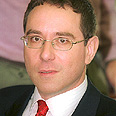
Lebanese poker
Nasrallah gambling again, but other players have nothing to lose
In a speech he delivered two days ago in southern Beirut, Hizbullah's secretary general called on Shiites in Lebanon not to fear a new civil war in the country. Only the weak side fears such possibility, and we're not weak," he said.
Nasrallah's speech followed the resignation of Shiite ministers from the anti-Syrian Lebanon government, which rejected Hizbullah's demand to receive more government seats and in fact gain veto power over any future government decision.
The timing of the crisis is not coincidental. Despite the crisis, Lebanon's government adopted two days ago the United Nations' proposal to establish an international court in order to try the accused in the killing of former Lebanon Prime Minister Rafik al-Hariri.
The accused have not yet been identified, but Hizbullah and Damascus apparently have a good reason for concern. The court could demand the extradition and indictment of senior Syrian figures close to President Assad who were mentioned as possibly involved in the murder earlier.
Yet Hizbullah's opponents are not quick to surrender and promise to fight back. After all, any concession to Nasrallah will turn him into the decision maker within Lebanese politics and into Lebanon's strongman.
Nasrallah is in fact uninterested in a civil war. He wants quiet and stability that would allow him to rehabilitate his organization. He and his Shiite supporters are still licking the wounds of the last war.
Yet Nasrallah is a gambler by nature. In July, too, he gambled that Israel would not be responding to the abduction of IDF soldiers. However, at that time he lost the gamble, and Nasrallah and his supporters were forced to pay a heavy price.
War created fragile reality
Now, he is gambling again, that eventually his opponents will cave in. The problem is that none of the Lebanese poker players have anything to lose any more. After all, any concession in the face of demands means handing over power in the country to Nasrallah, and this was not the aim behind Prime Minister Siniora and his colleagues' willingness to go such a long way.
It is possible that the compromise will be found at the last moment and everyone will continue to the next crisis. Yet another possibility is that Lebanon will find itself facing a grave crisis and even a renewed civil war.
For Israel, the conclusions of this crisis are clear. First, the last war and Security Council Resolution 1701 created a fragile, unstable reality on our northern border. Those comforted by the deployment of the Lebanese army and the international force may discover that once fire is exchanged in Beirut, these forces would be the first ones to leave the area.
Secondly, Nasrallah's willingness to challenge the Lebanese system's stability shows that he feels self-confidence and possibly believes that he regained the power and status lost during the war.
This raises the concern that sooner or later he will seek to revert the situation along the border with Israel to the reality that prevailed on the eve of July 12, 2006. After all, those who threaten a civil war within Lebanon would not be deterred from renewing their activity against Israel along the border.
Prof. Zisser heads the Middle Eastern History Department at Tel Aviv University










